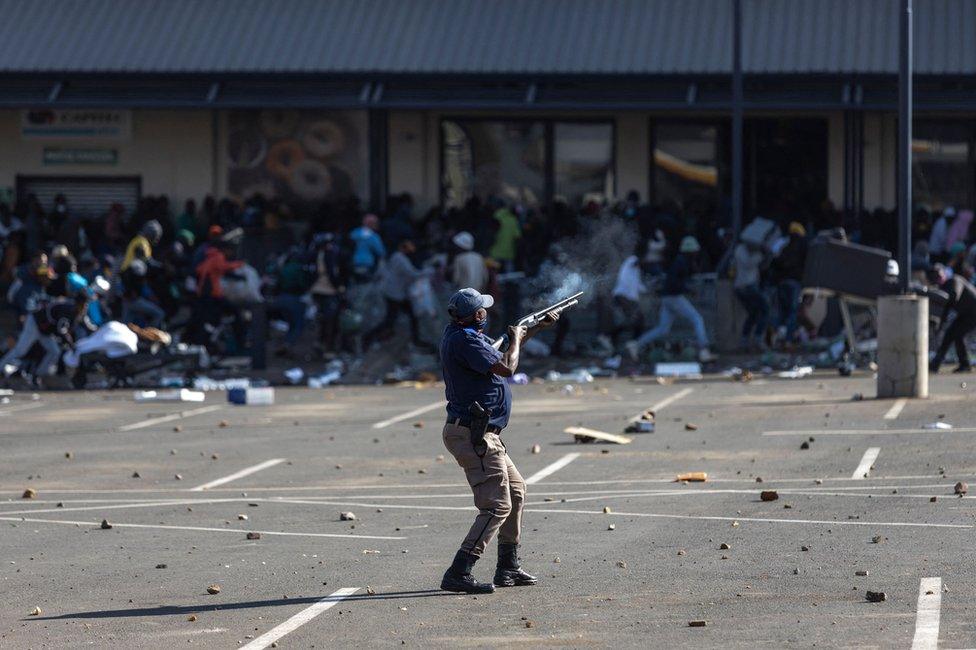South Africa riots: Looting and shooting in Durban
- Published

Protest began in KwaZulu-Natal province, but spread to Gauteng at the weekend
Protests which began after former South African President Jacob Zuma handed himself into police to serve a 15-month sentence have descended into days of violence and looting. The 大象传媒 has spoken to a few of the people caught in the middle.
"We are on fire," Ian - not his real name - tells the 大象传媒 from riot-hit Durban in South Africa's KwaZulu-Natal province.
In the last three days, he reckons he has managed an hour or two of sleep at a time. He and his team - who work for a private security company - are surviving on energy drinks as they wait and watch.
They have given up trying to stop the looting which has destroyed so many buildings since protests calling for South Africa's former President Jacob Zuma to be freed from jail began last week. Ian has heard reports of three security guards being killed since the weekend.
Now, they are just protecting the neighbourhoods where they live.
"We've gone to a place where we are going to watch them stealing, we are not interfering with them - don't harm us."
One Durban resident described how she can smell the smoke from the fires in her home
In another part of Durban, a woman is preparing to make the 20-minute drive to her family from her home in a badly hit residential area. She doesn't know if she will make it, or be turned back by one of the blockades which have popped up on the city's roads.
But she knows she cannot bear another night of lying in bed listening to the gunshots.
"I am so scared," the woman - who asked not to be named - told the 大象传媒.
"It literally feels like being in a war zone with gunshots, fires and smoke going up everywhere for the last two days."
A mother in Durban is forced to throw her baby from a building after it was set on fire
When the smoke clears, the best view of what is happening in Durban is from the air.
Jayshree Parasuramen, traffic reporter on East Coast Radio's helicopter, could see it all: factories burning, trucks moved to block roads and "thousands" of people looting shops and warehouses, with cars waiting to collect their ill-gotten goods.
"They formed a shield around the areas they were looting," she explains. "So, the entrances and exits were blocked, and a lot of people crowding around that area to not allow anyone or any motorists to pass."
The people, she said, were also "heavily armed".
"The amount of gunshots that we could hear was unbelievable - and then petrol bombs. We couldn't even hover around those areas because of them opening fire, and then eventually we just had to land, because of the live ammunition that they were using."
Food stores - many of which have been attacked - are running out of the basics
Officials - all the way up to President Cyril Ramaphosa - have all suggested the protests were hijacked by criminal elements.
Others believe the hardships exacerbated by the coronavirus pandemic created a tinderbox which just needed a spark to set it alight. The spark, in this case, was jailing Mr Ramaphosa's predecessor for contempt of court.
"We knew, when we locked down again, this was bound to happen, because the longer you leave people hungry, these events would take place," Eldrin Naidoo told the 大象传媒 from Johannesburg.
But, as Tumelo Mosetlhi points out, in the long run it will only harm those who are already struggling.
"To see people's shops and businesses being gutted - yes, people are hungry today, but tomorrow there will be more unemployment, more pain, more suffering in a nation that is trying to recover and rebuild itself."
The looting is akin to 'economic sabotage', says Jayshree Parasuramen
For the moment, those living in the areas at the heart of the violence cannot think about the future.
"You don't know if you are going to make it to tomorrow - that's the feeling right now," Jayshree Parasuramen says.
Ian and his team, meanwhile, have given up listening to the radio for information, and are now just watching for the gangs to approach.
"Saps [South African Police Service] are just inundated with calls that they are not taking calls anymore," he says.
"So we are calling on the local men in the area to try to come out and defend to keep their families safe."
Many business owners say they are protecting their own properties
But there isn't much they can do, if things go wrong. Rumours that people have been filling up canisters with petrol nearby have them all on edge.
"We carry paintballs [in our guns]," Ian explains. "So you know, we would be defending ourselves against petrol bombs with paintballs."
On Monday, the government announced it would deploy the army to help the overwhelmed police service, but those the 大象传媒 spoke to for this article had seen little evidence of troops in their areas.
But officials have yet to declare a state of emergency, and everyone feels let down.
At least 72 people have died in the violence - a number of them in a stampede
"The army only got here when it was already in smoke," says Ian.
"It's meant to go to hotspots but it is going to places that aren't even affected yet. We are lost for words."
"The focus should have been on the army keeping the civilians safe," says the woman hoping to reach her sister.
"It's not normal that civilians are expected to ward off all these rioters," she adds.
"How can it not be a state of emergency? How much cheaper can life get in South Africa?"
All pictures are subject to copyright. Additional reporting by the 大象传媒's South Africa team.
Related topics
- Published9 July
- Published13 July 2021